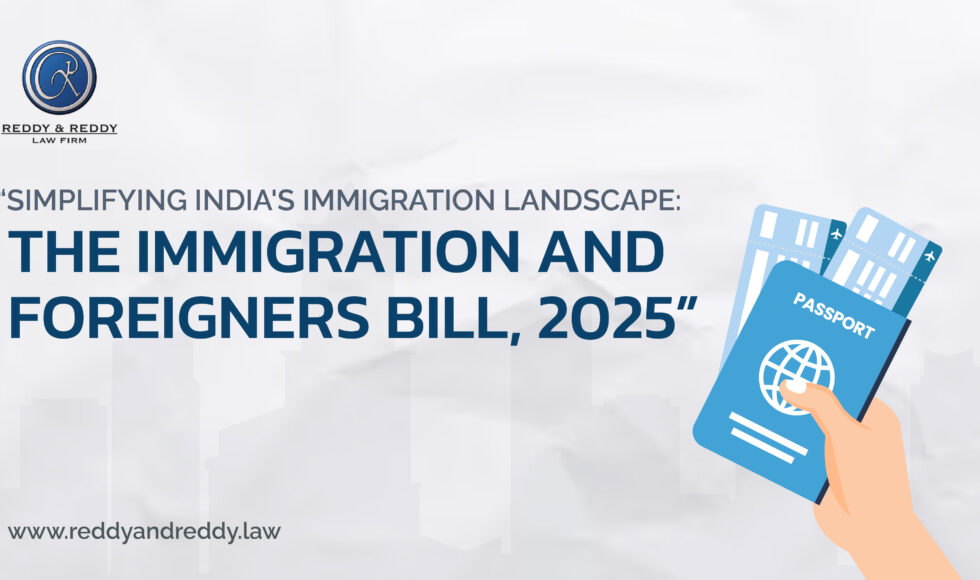The Immigration and Foreigners Bill, 2025, is set to redefine India’s immigration laws, streamlining regulations governing foreign nationals’ entry, stay, and exit. As businesses increasingly engage in cross-border transactions and foreign investment, understanding the legal landscape is crucial for compliance and risk mitigation.
WHY THE NEW BILL?
India’s current immigration and foreigners management system operates under multiple laws enacted during extraordinary times:
- The Passport (Entry into India) Act, 1920
- The Registration of Foreigners Act, 1939
- The Foreigners Act, 1946
- The Immigration (Carriers’ Liability) Act, 2000
These laws, while sharing common objectives, contain overlapping provisions that can create confusion and administrative challenges. The new bill seeks to harmonize these frameworks in line with the Government of India’s policy of simplifying laws and regulatory frameworks.
KEY HIGHLIGHTS OF THE IMMIGRATION AND FOREIGNERS BILL, 2025
STREAMLINED VISA AND TRAVEL DOCUMENT REQUIREMENTS
- Foreign nationals must possess a valid passport or travel document and visa to enter and stay in India.
- Immigration officers have the authority to examine and seize passports or visas found to be fraudulent or misused.
- Exemptions apply to certain categories under government agreements and special circumstances.
NEW OBLIGATIONS FOR EDUCATIONAL INSTITUTIONS AND BUSINESSES
- Universities and educational institutions must report details of foreign students to authorities.
- Employers hiring foreign nationals must comply with documentation and reporting requirements.
- Hotels, hospitals, and other accommodations must provide details of foreign guests to ensure regulatory compliance.
IMMIGRATION POSTS AND BUREAU OF IMMIGRATION
- The Bureau of Immigration will oversee enforcement and policy implementation.
- Specific immigration posts will be designated for entry and exit from India, ensuring better monitoring of foreign nationals.
ENHANCED ENFORCEMENT POWERS
- Foreign nationals can be refused entry or deported if deemed a security risk or in violation of immigration laws.
- The burden of proof regarding citizenship status lies with the individual.
- Immigration officers have the power to arrest individuals for violations without prior warrants.
INCREASED PENALTIES FOR NON-COMPLIANCE
- Unauthorised entry into India without valid documents could lead to imprisonment of up to five years or a fine of up to ₹5 lakh.
- Airlines, shipping companies, and other carriers face penalties of up to ₹5 lakh per passenger if they transport individuals who do not meet entry requirements.
- Forging travel documents or violating visa conditions could result in severe legal consequences.
IMPACT ON BUSINESSES AND INVESTORS
FOR EMPLOYERS AND CORPORATIONS
- Businesses employing foreign nationals must ensure compliance with visa and work permit regulations.
- Non-compliance could lead to hefty fines or operational disruptions.
- Companies engaged in cross-border transactions must assess how the law impacts foreign partners and employees.
FOR FOREIGN INVESTORS AND HNIS
- The Bill ensures a clear legal framework for foreign investments, making India a more predictable business destination.
- Investors seeking long-term residency or citizenship must adhere to new registration norms.
- Enhanced due diligence and documentation will be required for financial transactions involving foreign nationals.
FOR EDUCATIONAL INSTITUTIONS AND HEALTHCARE PROVIDERS
- Universities must maintain detailed records of international students and provide updates to authorities.
- Hospitals accommodating foreign patients must follow strict reporting protocols to comply with the law.
LEGAL CHALLENGES AND COMPLIANCE MEASURES
The bill introduces a robust enforcement mechanism, but with that comes potential legal challenges. Here’s how businesses and individuals can prepare:
- Review Existing Policies: Employers and businesses should audit their current compliance frameworks to align with the new legal requirements.
- Legal Assistance: Companies and individuals dealing with foreign nationals should seek expert legal counsel to navigate compliance requirements smoothly.
- Documentation and Record-Keeping: All businesses dealing with foreign clients, employees, or students must maintain accurate records to avoid legal issues.
- Proactive Engagement with Authorities: Businesses should establish clear communication channels with immigration and regulatory bodies to ensure adherence to the law.
FINAL THOUGHTS
The Immigration and Foreigners Bill, 2025, represents a significant step toward modernising India’s immigration management system. By consolidating multiple pre-Constitution era laws into a single comprehensive framework, the legislation aims to enhance national security while streamlining processes for legitimate travellers.
As the bill moves through the legislative process, stakeholders should monitor developments closely and prepare for the transition to the new system. Foreign nationals planning travel to India, businesses with international operations, educational institutions, and healthcare providers should familiarise themselves with the new requirements to ensure compliance.
In an increasingly interconnected global landscape, this legislation reflects India’s effort to balance national security interests with the facilitation of legitimate international travel, trade, and educational exchanges.

